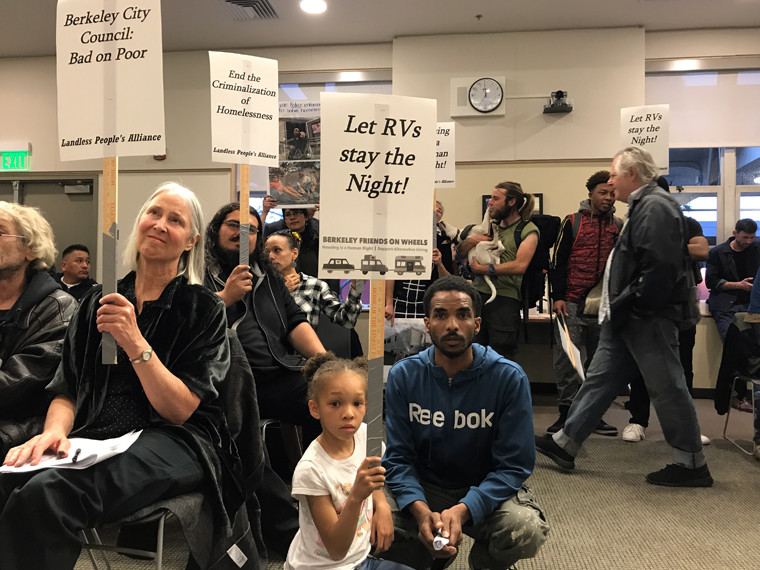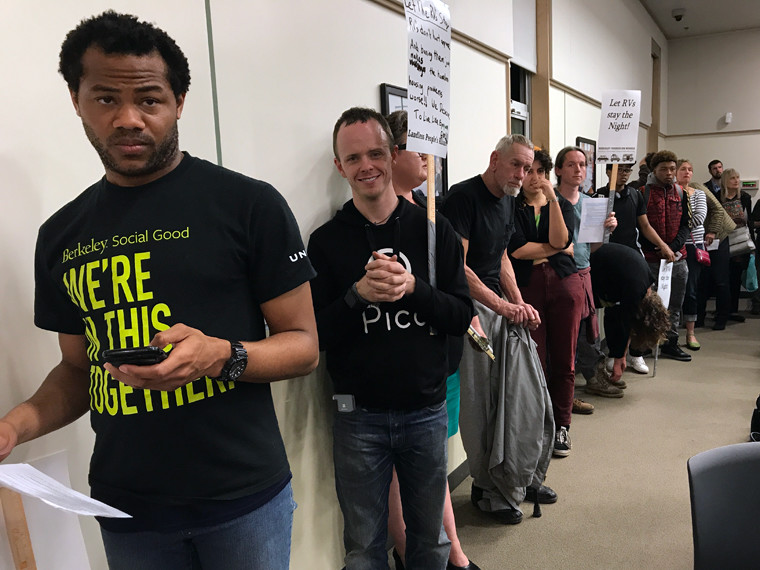A Berkeley City Council majority voted late Tuesday night, after more than three hours of emotional public comment, to outlaw overnight RV parking in Berkeley, but only after creating an RV permit system and committing to aid “priority populations” in their search for permanent housing.
Berkeley Affirms Ban on Overnight RV Parking — Once Permit System Is in Place

The permit would allow some vehicle dwellers to park in Berkeley for up to three months, with the possibility of an extension, and prioritize several groups, including families with young children, Berkeley workers, students who attend Berkeley schools, and people with a prior address in Berkeley over the last 10 years, said Councilwoman Sophie Hahn, who suggested that amendment to the Feb. 28 proposal to prohibit RV* parking in Berkeley from 2-5 a.m.
The change won’t happen immediately, though. The council majority also voted to suspend any enforcement of the parking ban — except for health and safety violations — until the new permit system is in place. That could take up to six months, officials said. The vote came just before midnight Tuesday amid chants of “shame” and “race traitor” from some members of the public who stayed late to hear the outcome of the discussion after much of the room emptied out.
Berkeley police say they have counted around 200 RVs throughout the city. West Berkeley, in particular, has seen a concentration of vehicle dwellers, the city has said, some of whom have been associated with an array of issues, from the improper disposal of hypodermic needles and human waste to crime and behavior problems.
Council members Kate Harrison, Cheryl Davila and Rigel Robinson voted against the ban, while the rest of the City Council — Mayor Jesse Arreguín, Sophie Hahn, Ben Bartlett, Rashi Kesarwani, Susan Wengraf and Lori Droste — voted for it. Tuesday’s vote was the second reading required of all city ordinances before they go into effect.
The bulk of the raucous crowd that assembled for Tuesday’s meeting called the parking ban inhumane and insisted that RV dwellers contribute to the Berkeley community in many positive ways. Many shared their stories of how they ended up on the streets and said no one should consider themselves immune from that fate. They said their vehicles have kept them from pushing Berkeley’s homeless population even higher and asked the city to support them, not add to their struggles to survive.
One young father told the council he moved his family from a house in Vallejo to an RV in Berkeley so his small children could get a Berkeley education. As he held her up to the microphone, his daughter (pictured at the top of this story) told the council she lives in an RV and wants to stay in the city.
Residents and members of the business community who took an alternate position said that, while they didn’t want to criminalize anyone, the city must enforce its rules. They said Berkeley has become a magnet for vehicle dwellers from elsewhere because enforcement has been so lax. Some said the impact on the parking supply alone has posed significant challenges for longtime West Berkeley businesses and their customers.
At one point, the council drew ire from some members of the crowd when the mayor tried to handle other business briefly before the council discussed and voted on the RV item, which was No. 21 on the agenda. Here is a video of that portion of the meeting:

After the lengthy public comment period, council remarks Tuesday were relatively brief, in large part due to the lateness of the hour and the council’s extended discussion in late February. Most “second reading” votes take place on the consent calendar without further discussion.
In her comments, Councilwoman Hahn called on “Apple, Google and the top 1,000 grossing companies in the Bay Area” to “step up” to help cities like Berkeley. She said the Bay Area’s overheated job market, created “with no regard for housing,” has been a huge factor in the worsening housing crisis, driving up rents and home values and pushing them increasingly out of reach.
“You have a huge role in creating this crisis,” she said, in what she called a “public appeal” to those companies. “I know you didn’t mean to, but you did. You are profiting from the workers you brought here. Wildly. Apple’s 2018 revenues exceed the combined budgets of all city government entities in the entire Bay Area. By a lot.”
Hahn then read her office phone number into the record and urged those companies to call her or any member of the City Council to “talk about how you can help us help our homeless and precariously housed. We need you to realize that you are not global. You are local, and you are responsible to our communities.”
Mayor Arreguín said the new law would involve intensive public outreach, along with work by the city to identify other places in the area for “safe haven parking” and the possibility of financial help for vehicle repairs. Wednesday night, he said, the Berkeley Unified School District is set to discuss the concept of letting BUSD families who live in RVs park on school property.
Harrison urged her colleagues to put off Tuesday’s vote until next week, when the council is scheduled to discuss an item she wrote with Davila to propose the creation of a “vehicle dweller program” in Berkeley. But her motion was unsuccessful.
Davila said, in her remarks from the dais, that she was upset with how the night had gone and remains unconvinced local businesses have lost money as a result of Berkeley’s street life: “We need to stop all this BS and hating on each other,” she said.
Davila and others said they want to look more deeply at the possibility of vehicle parking at the marina, and what state law may actually allow. City officials and staff have said previously that state law prohibits an encampment there.
Several council members agreed that perhaps the biggest source of tension between vehicle dwellers and those who want them to move has been the concentration of RVs in West Berkeley, where certain blocks have a high density of occupied vehicles.
Achieving more geographic dispersal alone would likely alleviate many of the criticisms people have raised, Councilman Robinson said.
He thanked his colleagues Arreguín, Hahn and Kesarwani for their updated proposal and its explicit commitment to outreach, help with repairs and “safe haven parking,” calling it “a far more empathetic solution” than the Feb. 28 proposal. But he said he still couldn’t vote for the new law.
“A lot of the reasons I voted no on the first reading still stand,” he said. “I don’t believe Berkeley should be in the business of evicting people whose lives are here.”
*According to the ordinance language, the new law would apply to “a single vehicle or combination of vehicles having more than two axles, a single vehicle or combination of vehicles 20 feet or more in length, or a single vehicle or combination of vehicles six feet six inches or more in width, and shall include, but shall not be limited to dump trucks, moving vans, tractors, pole or pipe dollies, recreational vehicles (RVs), campers.”
